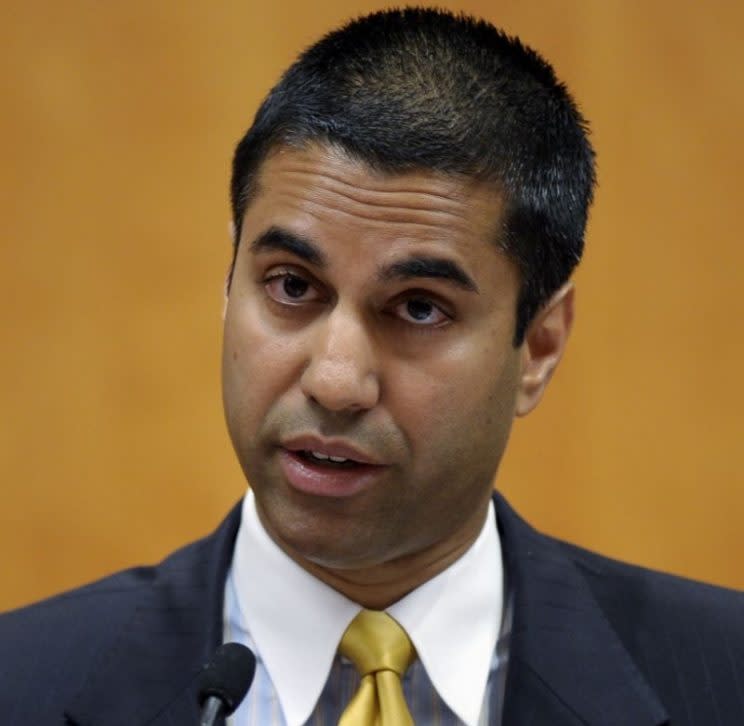Trump’s FCC bulldozes open internet rules without a plan B

The new chairman of the Federal Communications Commission is determined not just to demolish the net-neutrality rules the FCC passed two years ago, but to bulldoze their legal foundation.
FCC chair Ajit Pai laid out his position in a speech at the Newseum in Washington that left zero doubt about his hate for the current “Open Internet” rules banning internet providers from blocking, slowing or surcharging legal sites, apps and services.
It’s less clear, though, what Pai proposes to replace them with. While he pledged to put internet providers back under a looser regulatory standard and terminate the FCC’s refereeing of business decisions between internet providers and sites and apps running over their networks, his speech left open what sort of rules the FCC would write instead.
Past
Pai led off with a dubious recap of history. In his telling, broadband thrived from the passage of the Telecommunications Act of 1996 until Pai’s predecessor, former FCC chair Tom Wheeler, forced through today’s net-neutrality rules that subject internet providers to phone-company “common carrier” regulations dating back to the 1930s that require the equal treatment of customers’ traffic.
“Two years ago, the federal government’s approach suddenly changed,” Pai said. “The FCC, on a party-line vote, decided to impose a set of heavy-handed regulations upon the internet.”
But as the FCC’s own site shows, the commission didn’t reclassify cable providers to lift them out of the common-carrier bucket until March 14, 2002, not 1996.
That’s when the commission reclassified cable providers from open-ended “telecommunications services” to “information services” — a term that as, described in the 1996 law, better fits proprietary online services like floppy-disk-era AOL.
The commission didn’t extend the same treatment to phone-based providers until 2005.
“For decades before 2015, we had a free and open internet,” Pai said. “We were not living in some digital dystopia before the partisan imposition of a massive plan hatched in Washington saved all of us.”
Pai may not have remembered when iPhone owners could not place FaceTime video calls from their phones over a 3G signal because AT&T (T) blocked that use. Or when Comcast (CMCSA) interfered with BitTorrent file sharing in 2007.
He also may not remember the parade of telecom CEOs who from 2005 to 2006 declared their intentions to charge the likes of Google (GOOG, GOOGL) for getting a “free lunch” on their networks.
Those moves led the FCC to write basic net-neutrality rules that barred internet providers from blocking sites — but which a court found unjustifiable for “information services” after Verizon (VZ) sued to overturn them.
Present
Pai said the FCC was “dragged kicking and screaming” into reversing its information-service decision. The ruling that internet providers were once again common-carrier telecommunications services led to current net-neutrality rules, as well as the later broadband-privacy regulations Congress just killed.
(Pai would replace the privacy rules by letting the Federal Trade Commission police cases of abusive or deceptive conduct.)
That is true, but it wasn’t the Obama administration that did that — it was millions of angry customers who flooded the FCC with comments.
The chair said those rules had discouraged internet providers large and small from investing in broadband expansion, therefore hurting competition and choice.
“Among our nation’s 12 largest internet service providers, domestic broadband capital expenditures decreased by 5.6% percent, or $3.6 billion, between 2014 and 2016, the first two years of the Title II era,” he said, referring to the section of the Telecommunications Act of 1934 that first set out those common-carrier rules.
Those numbers come from economist Hal Singer, a longtime skeptic of net-neutrality rules. His underlying figures show providers like Comcast and Frontier (FTR) spending far more while Sprint (S) and the since-acquired Cablevision pulled back sharply.
Pai also cited a handful of much smaller internet providers who said the prospect of common-carrier rules discouraged them from expanding their coverage or improving their speeds. When Ars Technica’s Jon Brodkin spoke to some of these proprietors in 2015, he found some notable confusion about the substance and effect of these rules.
Pai’s pledge to scrap the “internet conduct” standard of the current rules — a catchall provision meant to stop network-level hangups like those that made Netflix (NFLX) unviewable on Comcast, Verizon and other ISPs a few years ago — could lift that anxiety.
The owner of one small but growing fiber-optic internet provider said these regulations were no obstacle. “The classification has not caused any reduction in our infrastructure deployment,” Dane Jasper, CEO of Sonic explained via email.
Polarization
The strangest and most disturbing part of Pai’s speech came in his denunciation of opponents as socialists who think “government control is the key to the ability to speak your mind on the internet.”
Pai suggesting that net-neutrality supporters represent “a larger movement in our country today that is fundamentally hostile to free speech” is not actually as bad as some of the things I’ve seen — like a 2016 ad comparing Wheeler to China’s internet censors.
But it represents yet another case of Net Neutrality Derangement Syndrome. We can and should have a grown-up discussion of how to increase woefully-lacking competition in broadband internet — something Pai himself has promised action on with rules to ease building the required infrastructure — that might check bad behavior more effectively than rules could..
But that won’t happen when an FCC chair can’t get through a 40-minute speech without descending into McCarthyist territory.
More from Rob:
Email Rob at rob@robpegoraro.com; follow him on Twitter at @robpegoraro.

 Yahoo Finance
Yahoo Finance 
